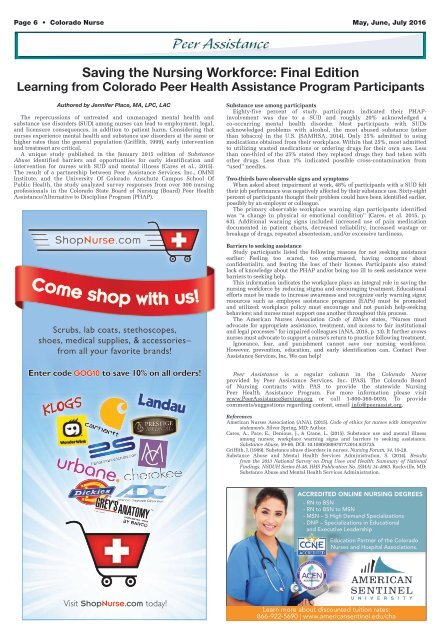Colorado Nurse - May 2016
Create successful ePaper yourself
Turn your PDF publications into a flip-book with our unique Google optimized e-Paper software.
Page 6 • <strong>Colorado</strong> <strong>Nurse</strong> <strong>May</strong>, June, July <strong>2016</strong><br />
Peer Assistance<br />
Saving the Nursing Workforce: Final Edition<br />
Learning from <strong>Colorado</strong> Peer Health Assistance Program Participants<br />
Authored by Jennifer Place, MA, LPC, LAC<br />
The repercussions of untreated and unmanaged mental health and<br />
substance use disorders (SUD) among nurses can lead to employment, legal,<br />
and licensure consequences, in addition to patient harm. Considering that<br />
nurses experience mental health and substance use disorders at the same or<br />
higher rates than the general population (Griffith, 1999), early intervention<br />
and treatment are critical.<br />
A unique study published in the January 2015 edition of Substance<br />
Abuse identified barriers and opportunities for early identification and<br />
intervention for nurses with SUD and mental illness (Cares et al., 2015).<br />
The result of a partnership between Peer Assistance Services, Inc., OMNI<br />
Institute, and the University Of <strong>Colorado</strong> Anschutz Campus School Of<br />
Public Health, the study analyzed survey responses from over 300 nursing<br />
professionals in the <strong>Colorado</strong> State Board of Nursing (Board) Peer Health<br />
Assistance/Alternative to Discipline Program (PHAP).<br />
Come shop with us!<br />
Scrubs, lab coats, stethoscopes,<br />
shoes, medical supplies, & accessories–<br />
from all your favorite brands!<br />
Enter code GOG10 to save 10% on all orders!<br />
Substance use among participants<br />
Eighty-five percent of study participants indicated their PHAPinvolvement<br />
was due to a SUD and roughly 20% acknowledged a<br />
co-occurring mental health disorder. Most participants with SUDs<br />
acknowledged problems with alcohol, the most abused substance (other<br />
than tobacco) in the U.S. (SAMHSA, 2014). Only 25% admitted to using<br />
medications obtained from their workplace. Within that 25%, most admitted<br />
to utilizing wasted medications or ordering drugs for their own use. Less<br />
than one-third of the 25% stated they replaced drugs they had taken with<br />
other drugs. Less than 1% indicated possible cross-contamination from<br />
“used” needles.<br />
Two-thirds have observable signs and symptoms<br />
When asked about impairment at work, 48% of participants with a SUD felt<br />
their job performance was negatively affected by their substance use. Sixty-eight<br />
percent of participants thought their problem could have been identified earlier,<br />
possibly by an employer or colleague.<br />
The primary observable workplace warning sign participants identified<br />
was “a change in physical or emotional condition” (Cares, et al. 2015, p.<br />
63). Additional warning signs included increased use of pain medication<br />
documented in patient charts, decreased reliability, increased wastage or<br />
breakage of drugs, repeated absenteeism, and/or excessive tardiness.<br />
Barriers to seeking assistance<br />
Study participants listed the following reasons for not seeking assistance<br />
earlier: Feeling too scared, too embarrassed, having concerns about<br />
confidentiality, and fearing the loss of their license. Participants also stated<br />
lack of knowledge about the PHAP and/or being too ill to seek assistance were<br />
barriers to seeking help.<br />
This information indicates the workplace plays an integral role in saving the<br />
nursing workforce by reducing stigma and encouraging treatment. Educational<br />
efforts must be made to increase awareness and recognize early warning signs;<br />
resources such as employee assistance programs (EAPs) must be promoted<br />
and utilized; workplace policy must encourage and not punish help-seeking<br />
behaviors; and nurses must support one another throughout this process.<br />
The American <strong>Nurse</strong>s Association Code of Ethics states, “<strong>Nurse</strong>s must<br />
advocate for appropriate assistance, treatment, and access to fair institutional<br />
and legal processes” for impaired colleagues (ANA, 2015, p. 13). It further avows<br />
nurses must advocate to support a nurse’s return to practice following treatment.<br />
Ignorance, fear, and punishment cannot save our nursing workforce.<br />
However, prevention, education, and early identification can. Contact Peer<br />
Assistance Services, Inc. We can help!<br />
Peer Assistance is a regular column in the <strong>Colorado</strong> <strong>Nurse</strong><br />
provided by Peer Assistance Services, Inc. (PAS). The <strong>Colorado</strong> Board<br />
of Nursing contracts with PAS to provide the statewide Nursing<br />
Peer Health Assistance Program. For more information please visit<br />
www.PeerAssistanceServices.org or call 1-800-369-0039. To provide<br />
comments/suggestions regarding content, email info@peerassist.org.<br />
References<br />
American <strong>Nurse</strong>s Association (ANA). (2015). Code of ethics for nurses with interpretive<br />
statements. Silver Spring, MD: Author.<br />
Cares, A., Pace, E., Denious, J., & Crane, L. (2015). Substance use and mental illness<br />
among nurses: workplace warning signs and barriers to seeking assistance.<br />
Substance Abuse, 59-66, DOI: 10.1080/08897077.2014.933725.<br />
Griffith, J. (1999). Substance abuse disorders in nurses. Nursing Forum, 34, 19-28.<br />
Substance Abuse and Mental Health Services Administration, S. (2014). Results<br />
from the 2013 National Survey on Drug Usee and Health: Summary of National<br />
Findings, NSDUH Series H-48, HHS Publication No. (SMA) 14-4863. Rockville, MD:<br />
Substance Abuse and Mental Health Services Administration.<br />
ACCREDITED ONLINE NURSING DEGREES<br />
- RN to BSN<br />
- RN to BSN to MSN<br />
- MSN – 5 High Demand Specializations<br />
- DNP – Specializations in Educational<br />
and Executive Leadership<br />
Education Partner of the <strong>Colorado</strong><br />
<strong>Nurse</strong>s and Hospital Associations.<br />
Visit Shop<strong>Nurse</strong>.com today!<br />
Learn more about discounted tuition rates:<br />
866-922-5690 | www.americansentinel.edu/cha

















